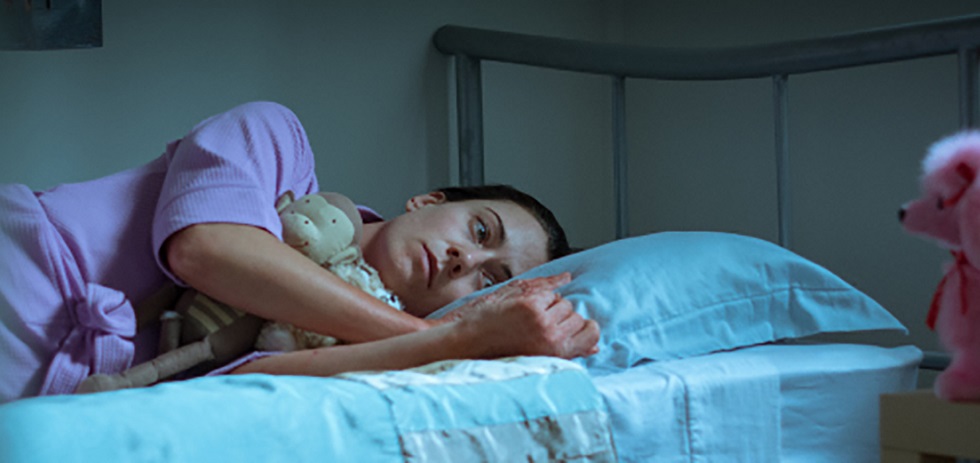The debut feature from Brisbane-based filmmaker Peter Blackburn, Eight is a tense and psychologically-draining cinematic workout that centres on a woman with debilitating Obsessive Compulsive Disorder (OCD). Shot expertly by Brad Francis (a cinematographic newcomer to look out for) in a single long take, the film is one of those rare Australian projects made outside of conventional funding bodies, and it’s all the better for it. It’s unlikely to draw too much of an audience outside of the festival circuit, due to its staunchly independent nature and bracing focus on the methodical repetition of action, yet this is what makes Eight such a refreshing and well-executed project, a rare modern Australian film in which all elements of production seem to coalesce wonderfully.
Eight follows Sarah Prentice (Libby Munro), a woman whose severe form of OCD has prevented her from leaving the confines of her home for the last two years. We follow her morning routine from the moment she wakes up, with her already fragile psychological state tested further by tasks that would seem mundane and simple to most, but for her are almost world shattering. Munro perfectly captures Sarah’s state of despair through her facial expressions, and strained, deliberate motion; it’s an extremely engaging and mentally arresting performance, and does well to elevate the film beyond the confines of its conceit into the realm of believability.
Formally, Eight operates in the psychological horror mode, and it crawls under your skin with every octupled repetition of the practises of self-harming – whether it be something overt like the scouring of one’s skin in the shower, or something as simple as the methodical, physically segmented making of a bed, all of which are actions that play on Sarah’s already unstable frame of mind. The restrained pacing and lack of cuts in Eight give every action the time to sink in, the frustrating elongation of her routine achieves a maximum state of unease. In this sense, the film offers far more than a traditional narrative about somebody with OCD, placing us in the headspace of the disorder effectively through its actual construction, rather than solely through plot-points and conceit.
Possibly the film’s greatest assets (in addition to Munro’s fantastic performance) are the excellent, tense music from Ryan Walsh (The Turning) and Paul Renton, as well as Francis’s wonderful, claustrophobic cinematography that perfectly frames shots around door frames and walls, as though we are getting a window into someone’s fractured psyche. The two work harmoniously to maintain Eight’s extremely precise tone, ensuring that the film conveys a completely overbearing sense of dread, elevating Blackburn’s admittedly straight-forward set-up onto another conceptual plane. Also of note is the make-up work of Leonie Douglas, which manages to stay intact for the entirety of the film’s single take, despite Sarah’s repeated showers and vigorous scrubbing. The cosmetic work really does a lot to create this air of believability throughout the whole tale and makes the film’s one-shot even more impressive.
It would be disingenuous to say that the film is without its faults. Most of the dialogue – there’s only about 30 or so lines as we are confined to a single character for the majority of the film’s runtime – feels contrived, very much coming across as a necessity in driving the film’s minimalist plot and creating a world outside of the confines of Sarah’s house moreso than organic narrative development. Thankfully, the delivery of dialogue once another physical presence is established markedly improves, however this only goes part way to redeem the film’s admittedly cardboard cutout segments of spoken word earlier on. As the dialogue is minimal, the film does unfortunately beg the question of how another Blackburn script would perform if it more dialogue heavy and with a weaker conceptual focus, however one thing he cannot be faulted on here is the strength – and execution – of Eight’s conceit.
It’s always exciting to be truly surprised by an Australian film, and it’s disappointing to see that Eight has not been selected for some of the other upcoming film festivals in Australia, its conceptual creativity alone places it above some of the local films that have played major festivals here in recent years. As it stands, it’s a neat little flick that will flourish in front of a festival audience, just as it did in the screening I attended at the Queensland Film Festival. It’s good to see a film with such a minimalist concept so fully realised, and I look forward to seeing what Libby Munro, Brad Francis, Leonie Douglas, and Peter Blackburn go on to do in the future; all have proven themselves to be more than in control of their craft.

